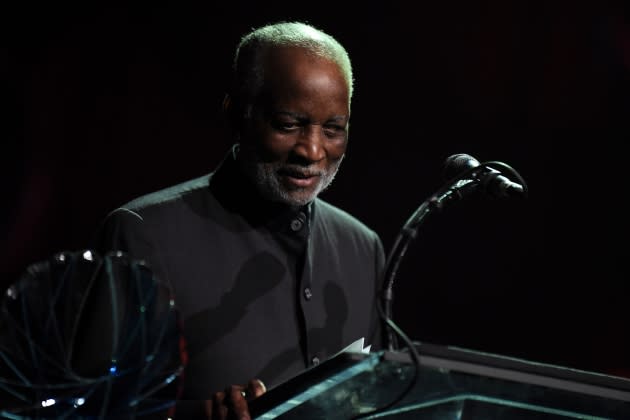Jazz Pianist Ahmad Jamal Dead at 92

Ahmad Jamal, the influential jazz pianist whose style influenced generations of musicians for seven decades, died on Sunday, The Washington Post reports. He was 92. His daughter Sumayah Jamal confirmed to Rolling Stone that he died in Ashley Falls, Massachusetts at home after a long battle with prostate cancer.
Jamal began his professional career while still in high school in his hometown of Pittsburgh, Pennsylvania, and continued to create and influence multiple music genres through his seven-decade career. Originally performing under the name Fritz Jones, he was among the first African American artists who publicly adopted the Muslim faith and began performing under the name Ahmad Jamal in the 1950s.
More from Rolling Stone
Al Jaffe, 'Mad' Magazine Cartoonist Who Created the 'Fold-In,' Dead at 102
Julián Figueroa, Son of Mexican Music Icon Joan Sebastian, Dead at 28
Jamal formed his own trio in 1951, which served as the house band for Chicago’s Pershing Hotel lounge. The popular Black-owned venue became the backdrop for his 1958 hit album, Ahmad Jamal at the Pershing: But Not for Me.
The live LP reached the top of the charts and stayed there for more than 100 weeks, buoyed by his standout rendition of “Poinciana.” Following the success of the record, he opened his own Chicago club called the Alhambra, where he recorded several albums until it closed in 1961.
He influenced myriad artists from the jazz world and beyond, including trumpeter Miles Davis to pianists McCoy Tyner, Cedar Walton, Bill Charlap, and Matthew Shipp. He eschewed genre boundaries, too, as he did in 1970, with his electric keyboard rendition of Johnny Mandel’s theme for “M*A*S*H.”
As hip-hop producers began to plumb the depths of jazz catalogs, a new generation of fans discovered Jamal through a slew of ingenious samples from DJ Premier (Gang Starr’s “Soliloquy of Chaos,”) Pete Rock (M.O.P.’s “Stick to Ya Gunz”) and Ski (Jay-Z’s “Feelin’ It”), among many others. In 1996, J Dilla famously sampled Jamal’s 1974 song “Swahililand” to craft the title track for De La Soul’s “Stakes Is High.”)
Born Frederick Russell Jones in Pittsburgh, Pennsylvania, on July 2, 1930, Jamal first began playing piano at the age of 3. He later studied under the tutelage of Mary Cardwell Dawson, who went on to found the first Black opera company in the U.S. By the time he was in high school, he was already earning money working gigs at nightclubs.
“It was 25 cents here, $6 there,” he told The Washington Post in 1983. “When I got up to $60 a week, which was as much as my father was making, I said, well, this is it.”
Following his time in Chicago, he moved to New York City, where he had a residency at Village Gate nightclub. He resumed touring in 1964 and in 1965 released the album Extensions. While he established himself with his interpretations of classic pop standards, in the Eighties he began moving toward more original compositions. In the Nineties, he released a series of LPs titled under The Essence.
Among his accolades, Jamal was named Jazz Master by the National Endowment For The Arts in 1994. In 2017, he received a Grammy Lifetime Achievement Award from the Recording Academy.
Best of Rolling Stone